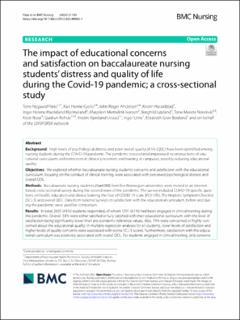The impact of educational concerns and satisfaction on baccalaureate nursing students’ distress and quality of life during the Covid‑19 pandemic; a cross‑sectional study
Flølo, Tone Nygaard; Gjeilo, Kari Hanne; Andersen, John Roger; Haraldstad, Kristin; Hjelmeland, Inger Helene Hardeland; Iversen, Marjolein M.; Løyland, Borghild; Norekvål, Tone Merete; Riiser, Kirsti; Rohde, Gudrun E.; Urstad, Kristin Hjorthaug; Utne, Inger; Beisland, Elisabeth Grov
Peer reviewed, Journal article
Published version

Åpne
Permanent lenke
https://hdl.handle.net/11250/3023228Utgivelsesdato
2022Metadata
Vis full innførselSamlinger
- Import fra CRIStin [3604]
- Institutt for helse- og omsorgsvitskap [2776]
Originalversjon
Flølo, T. N., Gjeilo, K. H., Andersen, J. R., Haraldstad, K., Hjelmeland, I. H. H., Iversen, M. M., Løyland, B., Norekvål, T. M., Riiser, K., Rohde, G., Urstad, K. H., Utne, I., & Beisland, E. G. (2022). The impact of educational concerns and satisfaction on baccalaureate nursing students’ distress and quality of life during the Covid-19 pandemic; a cross-sectional study. BMC Nursing, 21(1):185. 10.1186/s12912-022-00962-7Sammendrag
Background
High levels of psychological distress and poor overall quality of life (QOL) have been identified among nursing students during the COVID-19 pandemic. The pandemic necessitated improvised reconstructions of educational curriculums and restrictions in clinical placement and training at campuses, possibly reducing educational quality.
Objectives
We explored whether baccalaureate nursing students’ concerns and satisfaction with the educational curriculum, focusing on the conduct of clinical training, were associated with perceived psychological distress and overall QOL.
Methods
Baccalaureate nursing students (N=6088) from five Norwegian universities were invited to an internet-based, cross-sectional survey during the second wave of the pandemic. The survey included COVID-19 specific questions on health, education and clinical training, the Fear of COVID-19 scale (FCV-19S), The Hopkins Symptom Checklist (SCL-5) and overall QOL. Data from national surveys on satisfaction with the educational curriculum, before and during the pandemic were used for comparison.
Results
In total, 2605 (43%) students responded, of whom 1591 (61%) had been engaged in clinical training during the pandemic. Overall, 53% were either satisfied or fully satisfied with their educational curriculum, with the level of satisfaction being significantly lower than pre-pandemic reference values. Also, 79% were concerned or highly concerned about the educational quality. In multiple regression analyses for all students, lower levels of satisfaction and higher levels of quality concerns were associated with worse SCL-5 scores. Furthermore, satisfaction with the educational curriculum was positively associated with overall QOL. For students engaged in clinical training, only concerns about infecting others were additionally associated with psychological distress. None of the items related to clinical training were associated with overall QOL.
Conclusion
Nursing students’ educational satisfaction and quality concerns may significantly impact perceived psychological distress and overall QOL during a pandemic. However, with necessary adaptations implemented, concerns regarding the conduct of clinical training account for little of these associations.
